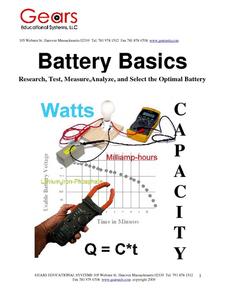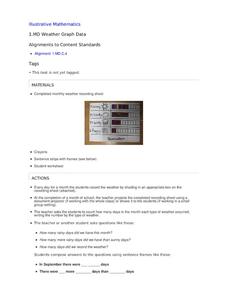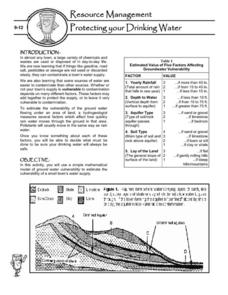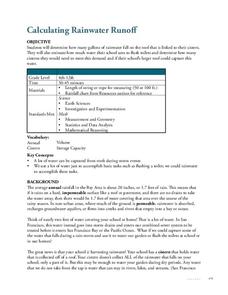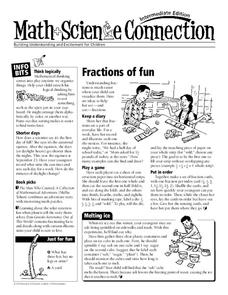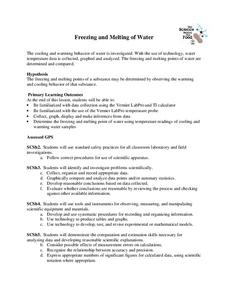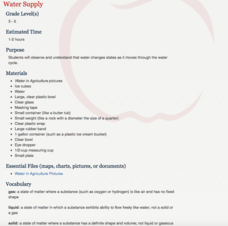Gears Educational System
Battery Basics
In a series of activities, high schoolers research and compare batteries of different chemistries (such as nickel-cadmium), measure current and voltage, and use multimeters and math to compute their capacities. In the end, they try to...
Illustrative Mathematics
Weather Graph Data
Teaching young mathematicians about collecting and analyzing data allows for a variety of fun and engaging activities. Here, children observe the weather every day for a month, recording their observations in the form of a bar graph....
The New York Times
Trouble in the Hive: Researching the Decimation of Honeybee Colonies
Teach your class about colony collapse disorder and foster discussion about causes and solutions for the honeybee problem. Class members read and discuss an article and participate in one of two detailed activities about pollination and...
Berkshire Museum
Camouflage!: Collecting Data and Concealing Color
Help young scholars see the important role camouflage plays in the survival of animals with a fun science lesson. Starting with an outdoor activity, children take on the role of hungry birds as they search for worms represented by...
US Environmental Protection Agency
Protecting Your Drinking Water
Having a clean, reliable source of drinking water is essential for any community, but in many cases this is easier said than done. Engage young environmentalists in exploring the five factors affecting vulnerability of a groundwater...
Sea World
Penguins
Everyone loves penguins! Learn about the flightless birds of the Antarctic with a series of lessons and activities. From the differences between the 17 species of penguins to the best way to remove oil from a penguin's features, kids...
Scholastic
Groundhog Day
A simple activity for a simple, but special, holiday. Young learners read a brief history of Groundhog Day, practice reading aloud, and then discuss how shadows are formed.
Teachit
Life Cycle of a Penguin
Celebrate the circle of life with this fun hands-on activity. After cutting out, gluing together, and assembling this visual model, learners are able to spin through and observe the life cycle of penguins.
Techbridge Curriculum
Calculating Rainwater Runoff
Thirsty plants soak up every bit of a rainfall, but what happens to the rain that hits the roof? Calculate the amount of rainwater from your school's roof with an Earth science activity, which brings measurement skills, observation...
Resources for Educators
Fractions of Fun
Reinforce concepts and encourage learner engagement with a collection of math games, science experiments, and cross curricular activities. In one fun resource, learners sort objects, keep a diary of everyday fractions, play a game using...
Curated OER
Plate Tectonics: Fifth Grade Lesson Plans and Activities
Fifth graders continue their investigation of the plate tectonics cycle with an exploration of the movement of Earth's crust. During the lab, young geologists conduct an experiment to discover the result of different types of stress...
Rainforest Alliance
Get in Touch with Nature
Take a trip to the Colombian rainforest through the sense of touch. Here, class members discover what's inside a mystery box: wood, cinnamon, Brazil nuts, a banana, and orange. Then, the class takes a trip outside for a tree rubbing...
Curated OER
The Gopher Tortoise
Can you believe the gopher tortoise was around when the dinosaurs were walking the Earth. Learn all about this creature that is one of Florida's most popular reptiles. Hands-on-activities and a glossary full of scientific terms make this...
University of Hawaiʻi
Taxonomy and Me!
Taxonomy is the study of organisms and how you phylum. Three biology activities are included, helping scholars understand four of the six kingdoms, specifically Protista, Plantae, Fungi, and Animalia. Scholars observe and classify in...
Virginia Department of Education
Building a DNA Model
It has been decades since the discovery of DNA. Still, activities such building this DNA model allow blossoming scientists to better understand the components that form this overall structure. During this activity, they will also...
NASA
Introduction to Astronomy
Welcome to your new job as an astrophysicist, astrobiologist, engineer, or research scientist at NASA. Your job is to search for alien life in our solar system! Throughout a unit of activities, learners search the galaxy through...
University of Colorado
Terra Bagga
Earth's magnetic poles switch positions about every 200,000—300,000 years. In the activity, groups create a planet with a magnetic field. Once made, they use a magnetometer to determine the orientation of the planet's magnetic field....
University of Colorado
Can Photosynthesis Occur at Saturn?
In the 19th activity of 22, learners determine if distance from a light source affects photosynthesis. Participants capture oxygen in straws and find that the amount of water the gas displaces is proportional to the rate of photosynthesis.
University of Georgia
Freezing and Melting of Water
Examine the behavior of energy as water freezes and melts. An engaging activity provides a hands-on experience to learners. Collaborative groups collect data and analyze the graphs of the temperature of water as it freezes and then...
National Institute of Food and Agriculture
Water Supply
Participate in three activities that look at the earth's limited water supply and the changes water goes through as it enters each phase of the water cycle. The resource is complete with three activities that demonstrate the changing...
National Institute of Open Schooling
Spontaneity of Chemical Reactions
Do spontaneous reactions really occur? Activity 12 in a series of 36 focuses on spontaneity of chemical reactions. Learners read about, discuss, and answer questions pertaining to entropy, explain the third law of thermodynamics, explore...
National Institute of Open Schooling
Mole Concept
Learners explore atomic measurement in the first activity in a series of 36. Through readings, activities, and questions, classes review standard SI units, learn about Avogadro's constant, and use it to help them calculate moles. They...
National Institute of Open Schooling
The Liquid State
Due to surface tension, dew — a liquid, is spherical in shape. Learners explore the properties of liquids in activity seven in this series of 36. Beginning with its basic properties such as boiling point and moving through to surface...
McGraw Hill
Doppler Shift Interactive
Ever wonder why a siren sounds different when it's coming toward you than when it's going away from you? It all depends on the motion of the sound waves! The interactive activity demonstrates how the Doppler effect impacts the motion of...
Other popular searches
- Activities Word Draw Rise
- Christmas Activities
- Multiplication Activities
- Writing Activities
- Spanish Christmas Activities
- Activities for the Snowy Day
- Math Activities
- Summarizing Activities
- Sequencing Activities
- Social Studies Activities
- Fitness Activities
- Prewriting Activities


